Some governments are run by one powerful person or a small group of people in a country. These types of governments are called authoritarian because the people must serve the government. Because of this, authoritarian governments frequently do not respect the rights of individuals. Sometimes, an authoritarian government may give the appearance of being something other than authoritarian. For example, they may hold elections, but those in control of the government will make sure they keep the actual power. Before the United States was founded, most countries were ruled by authoritarian governments.
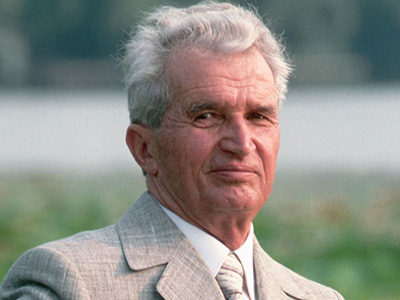
Nicolae Ceaușescu was the dictator of Romania from 1965–89 (image courtesy Biography).
Democratic Governments
Not all governments are authoritarian. In some countries, the people decided that the government should serve the people instead of the other way around. These governments are called democracies. There are many different kinds of democracies; most are responsible for creating an environment that promotes the common good. The common good is the idea that governments can try to make decisions that help most of the people in the group. Within a democracy, who is authorized to make decisions, in what ways the government is responsible to the people, and the kinds of choices people have vary widely. In most democracies, the ideas of rights and liberties is important. A right is something a person should have access to just because they are human. A liberty is a form of freedom that no government should take from an individual. The rights a person has simply because they are human are called, “natural rights.” Democratic governments tend to respect individual rights and liberties to a greater degree than authoritarian governments. At times, democracies may not respect the rights of a minority group because they are designed to follow the will of the majority.
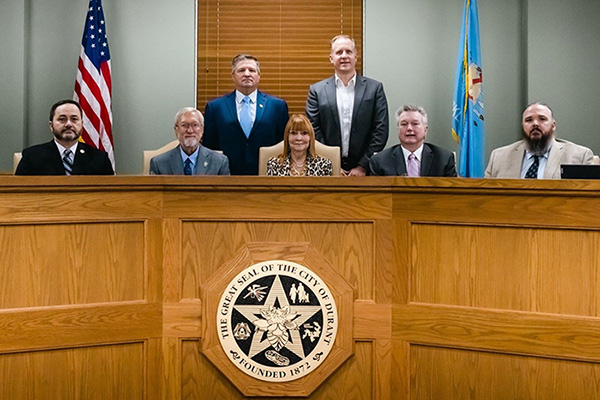
The Durant City Council is a representative democratic government body (image courtesy the City of Durant).
The US Constitution begins with the phrase, “We the People” to make clear that the people of the United States are where the government’s power lies, and that the government exists so that we can govern ourselves.

Students demand equality in Oklahoma, 1963 (20246.38.84.5, John Melton Collection, OHS).
Some governments are organized according to a set of rules that must be followed. The rules explaining how a government must operate are called a constitution. A constitution can also include protections for individual rights and liberties for all people, including minority groups. Governments that follow their constitution and laws closely respect the “rule of law.” Governments that follow the rule of law offer more protection for individuals because the decisions governments make have to be based on the rules. Another thing the rule of law introduces is the idea that there are some areas of life where the government cannot interfere. This idea is called “limited government.”
One way to understand “rule of law” is to think about your favorite sport: it has rules, right? You want to make sure the rules of the games are enforced fairly to all teams. This is also true of governments.
Another idea that some democracies consider important is the idea of equality. Many democracies will include in their constitutions that all people are equal and include rules to ensure that the people that run the government treat each person as having equal worth.
Monarchy
A monarchy is ruled by a hereditary leader, such as a king. Monarchies can be absolute, constitutional, or ceremonial. An absolute monarch controls the entire government; an example of this form of government is Saudi Arabia. A constitutional monarch has power and serves as the executive, but the constitution limits this power; Monaco has a constitutional monarchy. In a ceremonial monarchy, the monarch has very little power and performs ceremonial duties; Great Britain is an example of a ceremonial monarchy.
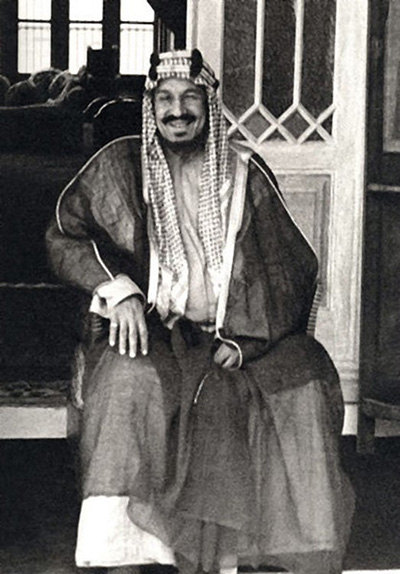
Abdul-Aziz ibn Abdul-Rahman al Faisal al Saud founded Saudi Arabia in 1932 (image courtesy History Today).
Dictatorship
A dictatorship is ruled by a group of people selected by one person. The people who run the government are responsible to the dictator and no one else. The country of Turkmenistan under Gurbanguly Berdimuhamedow is a good example of a dictatorship. While the country has a constitution, a parliament, and elections, Berdimuhamedow is able to make changes to the rules as he wishes whenever he wants.
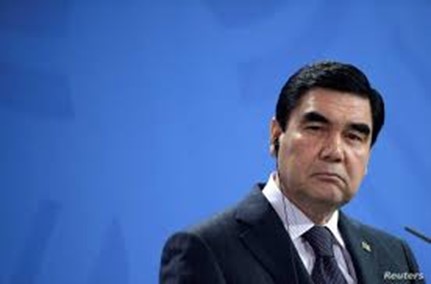
As of 2022, Gurbanguly Berdimuhamedow is the authoritarian leader of Turkmenistan (image courtesy Reuters).
Oligarchy
An oligarchy is ruled by a smaller group. There are many different kinds of oligarchies. In many places, the military holds the power. This type of government is called a stratocracy. Currently, Thailand is a country under military control. Another kind of oligarchy, a plutocracy, is where the wealthy are in control. During the Renaissance, the city-states on the Italian peninsula were often plutocracies. The country of Iran is a theocracy, which means that the country is controlled by a group of religious leaders. Another kind of oligarchy often practiced is rule by one political party, such as the Communist Party in China.
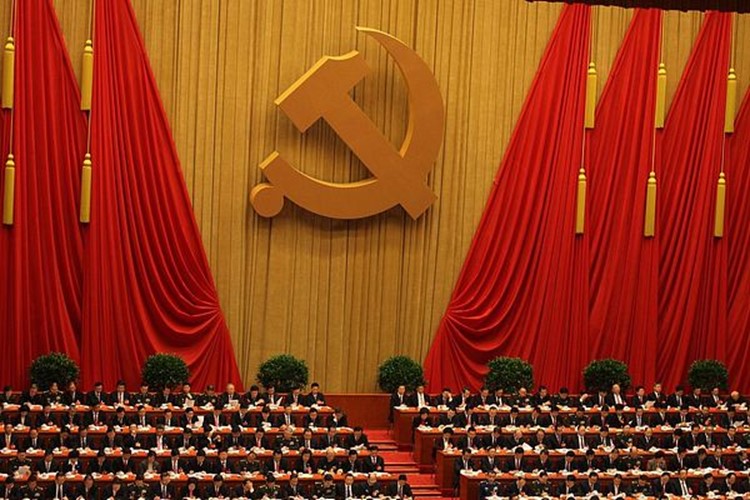
The Communist Party of China is a kind of oligarchy (image courtesy The Diplomat).
Parliamentary Democracy
A parliamentary democracy is a form of democracy in which the people elect a legislative body called Parliament. The executive, usually called a prime minister, is selected from this group. Often, parliamentary democracies will have many different political parties, and the parties will have to cooperate in running the government because no one party has a clear majority in the body. India has a parliamentary system.
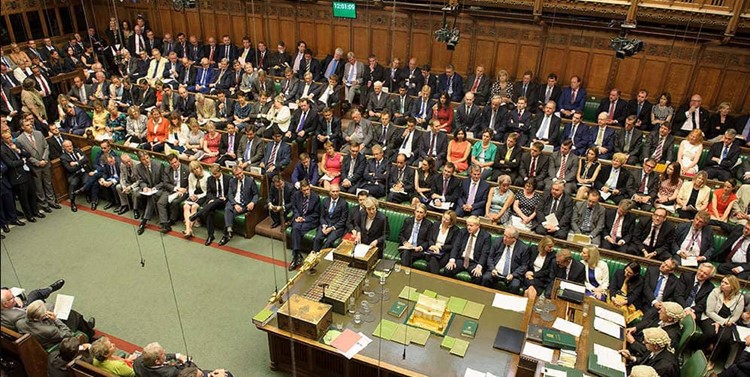
The chambers of the British Parliament are well known (image courtesy CNN).
Presidential Democracy
A presidential democracy is where voters select both their representatives in the legislative body and the executive. For example, in the United States, voters choose their representative every two years, electors who select their president through the Electoral College every four years, and their senator every six years.
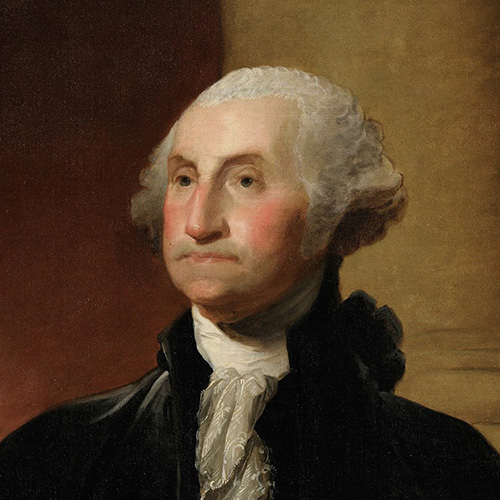
George Washington served as the United States’ first president (image courtesy of the White House).
Participatory Democracy
A participatory democracy is a form of government in which people have greater responsibilities than voting for representatives. This could include serving on advisory boards, commenting on policy changes, or proposing legislation. A specific kind of participatory democracy is called direct democracy. A direct democracy is a government run by all the people of a place. Most of the time, other types of governments will include elements of participatory democracy rather than organize the entire government around the idea that everyone should be involved in making day-to-day decisions.
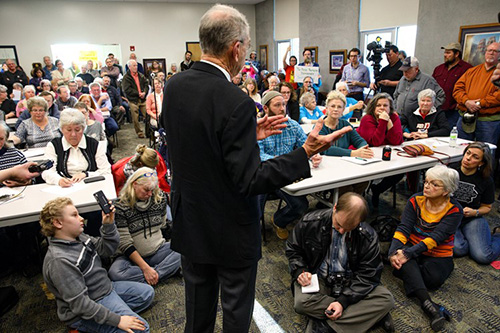
A town hall meeting is a kind of direct democracy (mage courtesy New York Times).



















